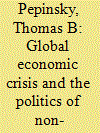| Srl | Item |
| 1 |
ID:
111684


|
|
|
|
|
| Publication |
2012.
|
| Summary/Abstract |
This article aims to start filling a gap in contemporary research on the rotating EU presidencies. In particular, the article pays attention to the role played by domestic factors in the development and fate of EU presidencies. What is the level of conflict between the government and the opposition during EU presidencies? This question is central for us and we address it through an in-depth analysis of one single case, Sweden, through a comparative examination of the role that domestic politics played in the Swedish EU presidencies of 2001 and 2009. In conjunction with our four main explanations for the varying degrees of political conflict during EU presidencies we present four hypotheses that could be advanced in the comparative study of EU presidencies.
|
|
|
|
|
|
|
|
|
|
|
|
|
|
|
|
| 2 |
ID:
111681


|
|
|
|
|
| Publication |
2012.
|
| Summary/Abstract |
This paper investigates the effects of the global economic crisis (GEC) on political change. A number of emerging European economies have experienced political turnover, but in other emerging and transition economies, government turnover and regime change have been comparatively rare. Two factors - incumbent governments' responsibility for the current crisis and their responsiveness to its domestic economic effects - shape the political effects of the GEC. Outside Europe, most emerging economies have experienced this crisis as an external shock to trade and investment rather than a domestic financial crisis. As a consequence, their governments have experienced less severe economic contractions, and have been able credibly to portray themselves as victims of, rather than causes of, the economic difficulties that they currently face. By placing political turnover in emerging Europe in comparative perspective, this argument provides a new perspective on the consequences of economic integration on national politics for emerging economies around the world.
|
|
|
|
|
|
|
|
|
|
|
|
|
|
|
|
| 3 |
ID:
111683


|
|
|
|
|
| Publication |
2012.
|
| Summary/Abstract |
In the 2010 Swedish general elections the nationalist party Sverigedemokraterna (SD) crossed the threshold and entered parliament. The other parties in parliament reacted with strong antagonism; the mainstreaming of the 'radical right' had finally come to Sweden. This article analyses the media coverage of the SD following the 2006 elections, when it emerged as a high-profile party in the public arena. The presence of the SD in Swedish politics encourages both SD allies and opponents to emphasize their views on what constitutes social cohesion in Sweden. We see the public debate surrounding the SD as a rhetorical struggle between different nationalist claims.
|
|
|
|
|
|
|
|
|
|
|
|
|
|
|
|
| 4 |
ID:
111685


|
|
|
|
|
| Publication |
2012.
|
| Summary/Abstract |
This study uses the case study of a 'transitioning' country, Turkey, in exploring institutional endurance and change. In this context it uses the framework of Arend Lijphart's majority and consensus democracy in order to uncover patterns of institutional evolution and persistence which have implications for the nature of its democratic transition. This is achieved through a step-by-step exploration of the key dimensions of democracy discussed by Lijphart. This empirical study seeks to demonstrate that despite the introduction of anti-majoritarian institutions in 1961, Turkey has never consolidated consensus democracy. Instead, since 1982 the trend has been a move towards a system more in line with the majoritarian regime established under the 1924 constitution. As such, the study offers a useful case study of the dynamics of political transformation in the face of institutional persistence, suggesting a need for tracing the history if we are to identify institutional patterns in contrast to the more generalized democratization frameworks.
|
|
|
|
|
|
|
|
|
|
|
|
|
|
|
|
| 5 |
ID:
111682


|
|
|
|
|
| Publication |
2012.
|
| Summary/Abstract |
Policy transfer has become a crucial aspect of the contemporary world of policy-making. However, the relationship between the actual process of policy transfer and the 'success' of policy outcomes generated by that transfer is an under-researched area. This article addresses the following key question: what factors affect the success, or otherwise, of policy transfer? This question is explored using a putatively successful case of policy transfer, the Gateway Review process between 2001 and 2010, focusing particularly on three of the early transfers of this process from the UK to Victoria and then to the Commonwealth level and New South Wales in Australia.
|
|
|
|
|
|
|
|
|
|
|
|
|
|
|
|